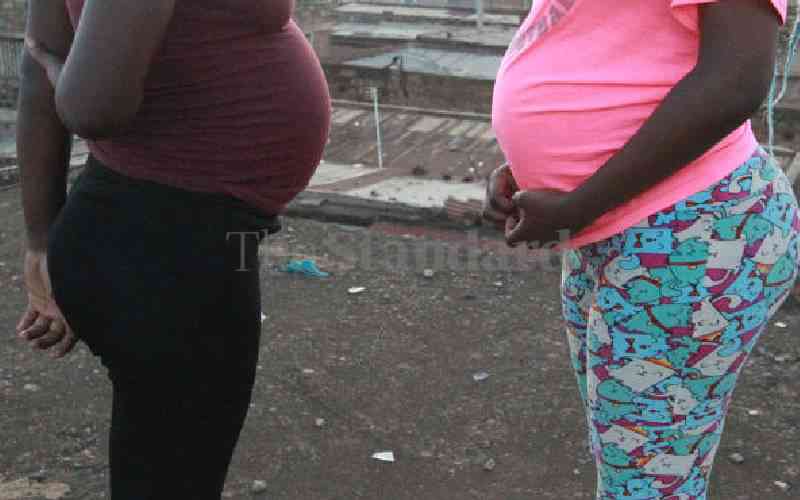By JAMES WANZALA
Hardly a week passes without the sad news that yet another schoolgirl has dropped out of school due to early pregnancy being reported in the media.
Perhaps the most recent shocking incident was reported this year, on June 10, when 18 pupils from Chepkurkur Primary in Mt Elgon, Bungoma County, were confirmed pregnant and had dropped out of school.
In the same month in Cheplanget Primary in Buret, Kericho County, five girls aged between 11 and 16 dropped out of school for similar reasons and boda boda riders were said to be the culprits.
And a survey by Plan International last year showed a total of 120 schoolgirls in Kilifi County were sexually abused and had dropped out of school due to, again, early pregnancies.
An almost true joke did the rounds on social media recently that teenage pregnancies and school drop-outs were no longer news in these and other regions.
The rates of such cases vary from one country to another, but more than 90 per cent occur in developing countries. In Kenya, teenage pregnancies remain high at 18 per cent though with regional differentials.
In most cases, boda boda riders and relatives are accused of luring young girls with money and other goodies. Other culprits include amorous teachers, male pupils and members of the public.
Health vs Development
Recent studies have shown sexual activity among young boys and girls is at an all-time high, with some schools reporting up to seven pregnancies a year.
According to the Kenya Demographic Health and Survey (KDHS) 2008/9, Nyanza and Coast provinces recorded the highest teenage pregnancies at the rate of 27 and 26 per cent.
On July 11, the world marked Population Day with a theme that sought to underscore the fact that adolescent pregnancy is not just a health issue but also a development issue.
According to UN Secretary–General Ban Ki-Moon, who describes himself as a staunch advocate of girl-child education, health and rights of girls, the topic is sensitive and demands a global approach.
He says 16 million teenage girls who give birth each year never had the opportunity to plan for the pregnancies.
Complications from pregnancy and early childbirth include grave disabilities such as obstetric fistula, which is the leading cause of death among the young women. They also face high levels of illness, injury and death due to unsafe abortions.
Stay informed. Subscribe to our newsletter
Ki-Moon says to address the problems we must get girls into school and enable them to receive a good education through their adolescence.
“When a young girl is educated, she is more likely to marry later, delay child-bearing until she is ready, have healthier children, and earn a higher income,’’ he said.
According to UNFPA, about 16 million girls between the age of 16 and 19 give birth a year, nine out of 10 are already married.
A 2007-10 survey by research firm African and Population Health Research Centre (APHRC) in Nairobi’s Korogocho slum, done among youths aged 12 to 22, people who live in schools are less likely to have initiated sex than those who are not in school.
“When you are in school, you have less time to involve in sexual activities and that’s why we have ‘Keep Girls in School’ campaigns,’’ says Caroline Kabiru, a researcher at the firm.
According to the survey, at that time, 13 per cent of boys in school had never had sex. For girls in school, seven per cent have never had sex compared to 67 per cent outside school who have had sex.
Information
“Poverty was blamed since many of the girls come from slum areas where there is a lot of poverty and some are forced to have sex with men to get money to buy personal effects like sanitary pads,” Caroline told Education.
She advises that to address this problem, the nation should pay attention to girl-child education by ensuring girls have access to education as well as sexual and reproduction health information and services.
She also says girls who drop out of school due to pregnancies should be made to understand that it isn’t the end of their education because after birth they can go back to school.
The Children’s Act provides for children’s rights to education in Section 7(1). It states, “Every child shall be entitled to education, the provision of which shall be the responsibility of the Government and parents.”
Section 7(2) affirms the right and entitlement for every child to free basic education, which shall be compulsory in accordance with Article 28 of the UN Convention on the Rights of the Child.
Outdated cultural practices in some communities have also contributed to teenage pregnancies and school drop-outs. There are communities that promote early marriages at the expense of education.
According to the Campaign to End Fistula, girls under the age of 15 are five times more likely to die during childbirth compared to those who get pregnant in their 20s.
Some At High risk
There are many other complications associated with teenage pregnancy hence all efforts should be made to prevent pregnancy among young girls. Such complications include low birth weight, pre-term deliveries, obstructed labour and higher rates of death in pregnancy and delivery.
The numbers of those teenagers visiting clinics for ante-natal services are few since many cannot afford the services or live too far from the clinics. For others, affording a single meal is a problem hence exposing them to more complications.
Apart from deaths associated with early pregnancies and other complications, sexual practices expose teenagers to sexually transmitted diseases.
Stakeholders are now advising the Government to include sexual and reproduction health education in primary school curricula since it has worked elsewhere.
They are also blaming the Teachers Service Commission for not enacting punitive measures to curb teenage pregnancies, instead transferring the teachers involved.
It is disturbing that those caught impregnating under-age girls have been left unpunished. This is a wake up call to parents who have been accused of neglecting the responsibility of imparting the right values and morals to their children.
 The Standard Group Plc is a
multi-media organization with investments in media platforms spanning newspaper
print operations, television, radio broadcasting, digital and online services. The
Standard Group is recognized as a leading multi-media house in Kenya with a key
influence in matters of national and international interest.
The Standard Group Plc is a
multi-media organization with investments in media platforms spanning newspaper
print operations, television, radio broadcasting, digital and online services. The
Standard Group is recognized as a leading multi-media house in Kenya with a key
influence in matters of national and international interest.
 The Standard Group Plc is a
multi-media organization with investments in media platforms spanning newspaper
print operations, television, radio broadcasting, digital and online services. The
Standard Group is recognized as a leading multi-media house in Kenya with a key
influence in matters of national and international interest.
The Standard Group Plc is a
multi-media organization with investments in media platforms spanning newspaper
print operations, television, radio broadcasting, digital and online services. The
Standard Group is recognized as a leading multi-media house in Kenya with a key
influence in matters of national and international interest.








